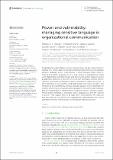Files in this item
Power and vulnerability : managing sensitive language in organizational communication
Item metadata
| dc.contributor.author | Healey, Patrick G. T. | |
| dc.contributor.author | Khare, Prashant | |
| dc.contributor.author | Castro, Ignacio | |
| dc.contributor.author | Tyson, Gareth | |
| dc.contributor.author | Karan, Mladen | |
| dc.contributor.author | Shekhar, Ravi | |
| dc.contributor.author | McQuistin, Stephen | |
| dc.contributor.author | Perkins, Colin | |
| dc.contributor.author | Purver, Matthew | |
| dc.date.accessioned | 2024-03-04T13:30:05Z | |
| dc.date.available | 2024-03-04T13:30:05Z | |
| dc.date.issued | 2024-02-23 | |
| dc.identifier | 299431902 | |
| dc.identifier | a77f2ba2-3792-4601-881f-435b3fe82ffc | |
| dc.identifier | 85186920028 | |
| dc.identifier.citation | Healey , P G T , Khare , P , Castro , I , Tyson , G , Karan , M , Shekhar , R , McQuistin , S , Perkins , C & Purver , M 2024 , ' Power and vulnerability : managing sensitive language in organizational communication ' , Frontiers in Psychology , vol. 14 . https://doi.org/10.3389/fpsyg.2023.1266425 | en |
| dc.identifier.issn | 1664-1078 | |
| dc.identifier.other | ORCID: /0000-0002-0616-2532/work/153977463 | |
| dc.identifier.uri | https://hdl.handle.net/10023/29416 | |
| dc.description | This project was funded by the Engineering and Physical Sciences Research Council (EPSRC) through the project “Streamlining Social Decision Making for Improved Internet Standards” (EP/S033564/1 and EP/S036075/1). MP was also partly supported by the Slovenian Research Agency via research core funding for the programme Knowledge Technologies (P2-0103) and the project Sovrag (Hate speech in contemporary conceptualizations of nationalism, racism, gender and migration, J5-3102). | en |
| dc.description.abstract | Organizational responsibilities can give people power but also expose them to scrutiny. This tension leads to divergent predictions about the use of potentially sensitive language: power might license it, while exposure might inhibit it. Analysis of peoples’ language use in a large corpus of organizational emails using standardized Linguistic Inquiry and Word Count (LIWC) measures shows a systematic difference in the use of words with potentially sensitive (ethnic, religious, or political) connotations. People in positions of relative power are ∼3 times less likely to use sensitive words than people more junior to them. The tendency to avoid potentially sensitive language appears to be independent of whether other people are using sensitive language in the same email exchanges, and also independent of whether these words are used in a sensitive context. These results challenge a stereotype about language use and the exercise of power. They suggest that, in at least some circumstances, the exposure and accountability associated with organizational responsibilities are a more significant influence on how people communicate than social power. | |
| dc.format.extent | 6 | |
| dc.format.extent | 310247 | |
| dc.language.iso | eng | |
| dc.relation.ispartof | Frontiers in Psychology | en |
| dc.subject | Politeness | en |
| dc.subject | Communication | en |
| dc.subject | Dialogue | en |
| dc.subject | Power | en |
| dc.subject | Organization | en |
| dc.subject | 3rd-DAS | en |
| dc.title | Power and vulnerability : managing sensitive language in organizational communication | en |
| dc.type | Journal article | en |
| dc.contributor.institution | University of St Andrews. School of Computer Science | en |
| dc.identifier.doi | https://doi.org/10.3389/fpsyg.2023.1266425 | |
| dc.description.status | Peer reviewed | en |
This item appears in the following Collection(s)
Items in the St Andrews Research Repository are protected by copyright, with all rights reserved, unless otherwise indicated.

